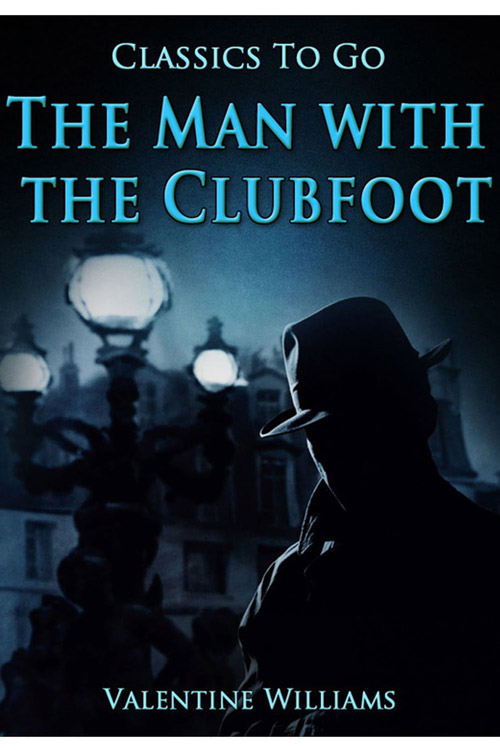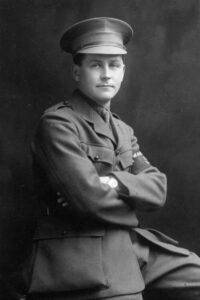
The Man with the Clubfoot
It was still pouring. As we rattled away over the glistening cobble-stones, my mind travelled back over the startling events of the day. My talk with old Dicky had given me such a mental jar that I found it at first almost impossible to concentrate my thoughts. That’s the worst of shell shock. You think you are cured and feel fit and well, and then suddenly, the machinery of your mind checks and halts and creaks. Ever since I had left the hospital convalescent after being wounded on the Somme (“gunshot wound in head and cerebral concussion”, the doctors called it), I had trained myself, whenever my brain was en panne, to go back to the beginning of things and work slowly up to the present by methodical stages.
Let’s see then—I was “boarded” at Millbank and got three months’ leave; then I did a month in the Little Johns’ bungalow in Cornwall. There I got the letter from Dicky Allerton, who, before the war, had been in partnership with my brother Francis in the motor business at Coventry. Dicky had been with the Naval Division at Antwerp and was interned with the rest of the crowd when they crossed the Dutch frontier in those disastrous days of October 1914.
Dicky wrote from Groningen, just a line. Now that I was on leave, would I come to Groningen and see him to see if I could travel? “I have had a curious communication which seems to have to do with poor Francis,” he added. That was all.
My brain was still halting, so I turned to Francis. Here again, I had to go back. Francis, rejected on all sides for active service, owing to what he scornfully used to call “the shirkers’ ailment, varicose veins,” had flatly declined to carry on with his motor business after Dicky had joined up. However, their firm was doing government work. Finally, he had vanished into the maw of the War Office, and all I knew was that he was “something on the Intelligence.” More than this, not even he would tell me. When he finally disappeared from London, just about when I was popping the parapet with my battalion at Neuve Chapelle, he left me his London chambers as his only address for letters.
Ah! Now it was all coming back—Francis’ infrequent letters to me about nothing, then his will, forwarded to me for safekeeping when I was home on leave last Christmas, and then, silence. Not another letter, not a word about him, not a shred of information. He had utterly vanished.
I remembered my frantic inquiries, my vain visits to the War Office, and my perplexity at the imperturbable silence of the various officials as I impatiently waited for news of my poor brother.
Read or download Book
Valentine Williams
George Valentine Williams, (1883–1946) was a journalist and writer of popular fiction.
Biography.
Williams was born in 1883. He was the eldest son of the chief editor at Reuters; both his brother and an uncle were also journalists. He replaced Austin Harrison as the Reuters correspondent in Berlin in 1905, aged 21. In 1908, he left Reuters to join the Daily Mail, filing stories from Paris and covering the Portuguese Revolution of 1910. He was in the Balkans at the outbreak of World War I and became one of the first accredited war correspondents in March 1915. William Beach Thomas had been reporting the war for the Daily Mail in the period before official accreditations were granted. When the British government relented its opposition to the presence of journalists in 1915, having been warned by Theodore Roosevelt that reporting limitations were affecting public opinion in the United States, Williams stepped into the role.
In December 1915, Williams enlisted for service in the Irish Guards and Beach Thomas took his place as an accredited reporter in France. Williams was awarded the Military Cross as a soldier and wrote two autobiographical books about his wartime experiences. In the aftermath of the war, he traveled widely as a reporter, covering events such as the Versailles Peace Conference and the discovery of the tomb of Tutankhamun, as well as events in America. Harold Nicolson met him in connection with events at Versailles and described in a diary entry that “He is far too intelligent to be employed by such a paper” (the Daily Mail). It was during this period that he began writing thrillers and around 1926 he gave up his post as Foreign Editor of the Daily Mail to pursue a full-time career as an author.
Williams was too old for active service at the outbreak of World War II. He joined the Secret Intelligence Service, vetting potential recruits such as Malcolm Muggeridge and Kim Philby. He was transferred to the British Embassy in Washington in 1941 but soon after left for Hollywood, where he worked as a scriptwriter for Twentieth-Century Fox and Metro-Goldwyn Mayer.
Williams was married to Alice Crawford. He died in 1946.






